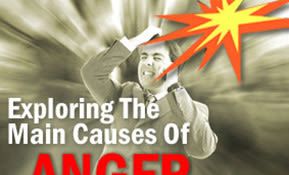
The Anger Equation, Part 2
When a person deflates his own inflated ego, he has fewer conflicts with others, and goes through life with minimum conflict with no cause for anger...

We are exploring the two main causes of anger: arrogance and lack of spiritual awareness. We now analyze our story of the Prancing Buck in order to have clear understanding of the damaging effects of arrogance.
* * *
The Moral of Dandy’s Antlers
Let’s take a second look at our deer story. Zachary – despite the limitations of age – continues to rule over the clan. He’s a more than benevolent monarch, who controls his herd by virtue of his wisdom, experience, and superb character. Even in the most trying situation of public degradation, Zachary remains dignified, composed, and in complete control of his emotions, the sign of a true leader. His brain dictates his decisions, not whim or mood. He prefers an unassuming modesty to a regal crown, and therefore keeps his antlers closely trimmed.
Zachary lives peacefully with the whole world, but nonetheless stands steadfast in the face of tyranny. Like the finest of deer, he is very spiritual and a strong believer in God.
Dandy sorely lacks character development. He is vain and arrogant, concerned only about himself and his physical development. Dandy wastes time and effort on image building, having groomed his fancy antlers to impress others. He lacks the character and leadership qualities to lead a herd, yet his arrogance doesn’t allow him to accept the reign of another, more qualified buck.
Dandy’s antlers are the symbol and epitome of egotism and arrogance. He is blind to truth; he believes that one hundred year old trees should grant the right of way to his antlers. He’s angry at the entire forest.
The forest symbolizes the world, the trees represent other people, and the trail is an allegory of one’s personal journey through life. Were Dandy to trim his antlers, he could have traversed the forest speedily, harmlessly, and peacefully. By the same token, when a person deflates his own inflated ego, he has fewer conflicts with others, and goes through life with minimum conflict with no cause for anger.
That’s what I meant about the University of the Trail. Back in college, we’d study all night long to pass an exam in Psychology 303 or Sociology 402. A few days later, we’d forgotten nearly everything. On the other hand, we never forget the memorable lessons of observation. By looking at the sharp contrast between Zachary and Dandy, we readily internalize a vital message about ethics, character development, and overcoming anger. All we have to do is keep our eyes open and look for the Divine wisdom in every creation. Such lessons in life become engraved in our hearts forever.
Let’s further examine how arrogance brings on anger.
The Anger Equation
Here’s how we can describe the cause and intensity of anger mathematically:
Expectations – Realizations = Anger
The more arrogant a person is, the higher his or her expectations. When in reality, the arrogant people don’t receive the homage they think they deserves, or in other words, life’s realizations fall short of their expectations, the resulting gap manifests itself in anger.
The Expectation Scale
No Expectations Full Expectations
0 10 20 30 40 50 60 70 80 90 100
Here’s an example: Imagine a scale of expectations from 0 to 100, whereas “0” signifies no expectations from others, and “100” means maximum expectations from the whole world. A tyrant, for example, is an ego-driven person of extreme arrogance who expects absolute deference from every individual.
Let’s assume that the tyrant’s expectations from others rate 100 on the scale, since he demands absolute deference. Now, assume that a person receives an audience with the tyrant. That person greets the tyrant politely, but fails to bow down to him and kiss his hand. If such a greeting earns a score of 70, then a gap of 30 points remains between the tyrant’s expectations and the person’s greeting, in other words, the situation realization. These 30 points of anger are usually sufficient for a tyrant to execute a person. Here’s how our tyrant’s anger looks as an equation:
The tyrant’s expectations 100
Realization – 70
Anger = 30
Arrogant people waste considerable time and energy on anger, since their expectations are rarely met. Living with such a person is a difficult tribulation in itself, comparable to walking on eggs without breaking them. Family members of arrogant and angry people frequently suffer from a number of nervous disorders of various degrees, unless they’ve made a concerted effort on attaining spiritual awareness (see Chapter Four).
The anger equation also explains why modest people are always happy. A modest person has few expectations, if any, from his fellow human being. Let’s assume that a modest person has low-level expectations that score “30” – he’s happy as long as people aren’t throwing tomatoes at him. A person greets him politely on the street, with a cordial hello that would earn a score of “70,” resulting in a negative anger gap of 40 points. Negative anger is happiness, or tranquility. As such, the modest person, with minimal expectations, is constantly happy and tranquil, and a pleasure to live with. Now, let’s view this example as an equation:
The modest person’s expectations 30
Realization – 70
Anger = – 40
Negative anger is happiness.
The anger equation is a useful tool for self-evaluation. Try your best to be honest and objective about yourself, and score your expectations against the actual situation realizations that you encounter in daily life. You’ll gain an amazing insight about yourself.
Arrogance, as Dandy’s antlers and the anger equation demonstrate, is the prime cause of anger. The second major cause of anger is lack of spiritual awareness.
All of one’s troubles, tribulations, and shortcomings stem from a lack of spiritual awareness. The more one gains spiritual awareness, the more one neutralizes shortcomings. — Rebbe Nachman of Breslev
To be continued…
(The Trail to Tranquility is available in the Breslev Store.)












Tell us what you think!
Thank you for your comment!
It will be published after approval by the Editor.